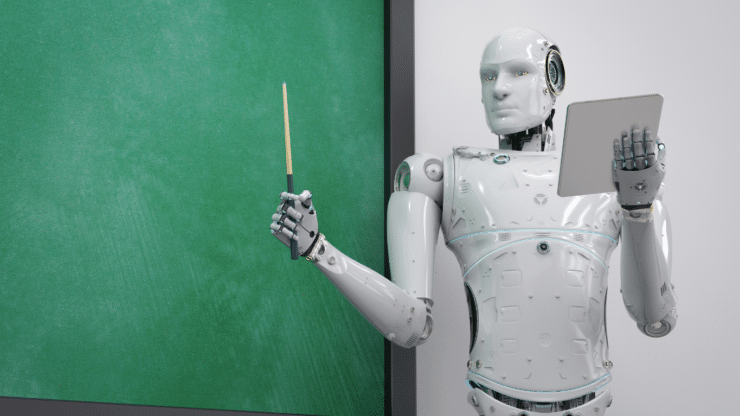With the global unleashing of advanced, AI chatbots like ChatGPT onto the world, there’s been a lot of talk over AI replacing teachers. This debate has been happening for years both in the online and brick-and-mortar education spaces.
Although billions have been invested in AI technology, it is still far from capable of replacing human teachers, despite the efforts of some businesses and schools to do so.
Even if AI suddenly became incredibly advanced, robots could never replace teachers because we are more than just vessels that spout information and tell students when they’re right or wrong. We have many hats that we wear that machines can’t replicate.
Overpromising and Exaggerated Capabilities
Over the past several years, online education businesses have exaggerated the capabilities of their AI-powered apps in order to get more customers. I used to work for a Chinese company called VIPKID, which is an online English language school that mostly catered to children in China. They sold English lessons with live, native-speaking English teachers who were mainly from the U.S.
VIPKID invested millions into their AI and eagerly promoted using AI in their digital classrooms to get parents to buy classes. They promised that AI would be able to keep track of their children’s progress, monitor their interest in class, as well as provide a personalized learning experience.
It was very overhyped though. VIPKID’s “AI” ended up being really faulty and gave parents inaccurate and even flat-out false assessments of their kids.
Many kids don’t like to have their faces on camera when taking an online class, so many times we’re teaching the tops of their heads or their desks instead. The AI analyzes the child as not being interested, since their full face is not on camera. But many times, they’re actively participating in class, it’s just the AI can’t see that because it doesn’t understand the non-visual ways that a teacher can gauge a student’s interest in the lesson.
With the Chinese crackdown against tutoring schools in 2021, VIPKID was no longer allowed to sell lessons taught by English teachers outside of China. Instead, they immediately rolled out classes taught by AI which ended up being a disaster because the AI technology they had was not ready to replace human teachers.
After the rollout of AI classes, many VIPKID teachers posted on social media about how parents were contacting them, upset that their child could no longer learn with a human English teacher. The parents also complained about how faulty the AI technology was.
A Reddit post by a former VIPKID teacher discusses the issues parents were having.
“Had a parent of a former student reach out… After we [the teachers] got nixed, the student was switched to a native speaker living in China and then to Chinese teachers. They are only now starting the AI classes. She said the AI is terrible. Full of bugs and issues. They really dislike it and the courses are nothing, but problems.”
I also worked for an English learning app for kids that promoted using AI to customize a student’s learning and give them instant feedback on their pronunciation. The company also tried to roll out English classes taught by AI. This AI technology was a huge part of their marketing campaign, but the “AI” was very clunky and didn’t even work most of the time.
What the app was using wasn’t AI at all and was just a program that gave kids very inaccurate pronunciation feedback. The app even said my pronunciation was incorrect even though I’m a native English speaker and my voice was used to program the app!
China has invested billions into AI technology but it’s still nowhere near good enough to even be helpful for teachers, let alone replace them.
This disturbingly dystopian video by the Wall Street Journal shows a school in China powered by AI technology that monitors the students all day through uncomfortable, plastic headbands that they are forced to wear.
Data of the students is collected through the headbands and sent to teachers, parents, the Chinese government, and unknown entities who could easily misuse that data.
Despite looking like an episode of Black Mirror, the “AI” is not as intelligent as the school and Chinese government proclaim. In the video, Theodore Zanto, a neuroscientist at the University of California San Francisco laughs as he points out the tech being used in the “AI school” is typically used in hospitals and labs and can easily give inaccurate information.
Zanto goes on to explain that if the headband is faulty, not put on properly, or if the wearer is itchy or fidgety, it can give an incorrect reading. So basically, all the students at that Chinese AI school are being tormented for no reason. One student in the video even mentioned being punished at home if the data collected on him that day said he was unfocused for a moment.
So far, all this talk of AI being this groundbreaking tool for education has been just a bunch of hype with little to no value to the students themselves aside from being a novelty and an interesting subject to debate over in class.
You could argue that the AI mentioned so far is a couple of years old, so even though AI has not been that great yet, that doesn’t mean it won’t be in the future. Just look at how incredible ChatGPT and other AI tools are now and they just came out!
ALSO: When Your Teen Follows (or Maybe Even Loves) a Bot
Let’s say that AI is finally able to give accurate and truthful information 100% of the time instead of giving false information too much of the time like ChatGPT does now. And AI can actually read human body language well and accurately assess a student’s mood and interest in class even if they fidget or hide their face. And this future AI can come up with engaging lessons and ways to teach students to keep them interested.
Even if AI could do all of those things, it still could not replace a human teacher. Human teachers do more than spout facts and dish out tests. If that’s all teaching was about, then sure, a robot could totally do that! But we do much more than that. And some of us, don’t even teach in the traditional way at all. Instead, we teach using either a play-based or project-based teaching approach that is very flexible and changes all the time.
Aside from teaching students using whatever method our school allows, we read our students’ body language and talk to them to make sure they’re ok physically and mentally. We’re able to pick up on subtitles in human behavior that an AI could never pick up on. A lot of what we do is through intuition which is not something that can be programmed into a robot.
Human teachers can quickly change topics and adapt to the individual needs of our students to help them learn and get them more excited about learning. We teach students important communication and social skills through our interactions and through our encouragement of group activities.
We provide real personalized learning that gives students a voice and more autonomy over their education, which are essential for learning. Robots can provide adaptive learning techniques which can give instant feedback and adjust lessons based on an algorithm and the students’ responses, but it can’t give students the freedom to learn outside of the robot’s programmed list of lesson topics.
Even if the robot is given millions of possible ways to teach a student, it still cannot provide empathy, emotional support, and creativity the way human teachers can. It also cannot provide that support to the parents who often need it too.
As more parents and educators realize that schools need to focus more on individuality, critical thinking, and creativity and move away from homework, worksheets, and tests, this debate over whether AI will replace teachers will finally be put to rest. Students are not robots and their learning involves a lot more humanity than whatever the most advanced AI technology can provide.









Add comment